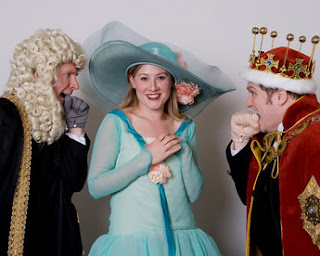
A play is struggling to get out of Commencement, but the liberation has yet to take place.
Written by David Allyn, the drama is a new entry in this year's Baltimore Playwrights Festival.
Performed at the Vagabond Players, the play concerns the travails of Danni, a college senior on the verge of graduation---or is she? Blasting into her life for the commencement exercises are her (disinvited) father and her (equally unwanted) mother. To make matters more complicated, her father has brought along his much younger trophy fiancee, a lingerie model. Reciprocating, the mother has brought along her twenty-something policy advisor, who also doubles as her sometime lover.
The opening comical pop-ins and pop-outs quickly settle down into more serious business as Danni announces that she is not graduating, has dropped out of college, and has converted to Islam. Much of the rest of the play is devoted to rather wearying discussions of Danni's motives, the need to find a meaning in life, and the emptiness of conventional religion, especially for this family of secularized New York Jews. The script does not avoid the vapors of this sort of discussion and rarely rises above cliche in its more soul-searching moments.
Karin Crighton's direction crisply moves the cast around the set, which convincingly duplicates the standard dilapidated off-campus apartment of undergrads. This is truly ensemble acting, with each actor carefully reacting to others as well as delivering his or her own lines. Each actor is convincing in his or her role: Stacey Bonds as the frustrated Danni; Rodney Bonds as the aging businessman facing unemployment and decline of virility; Patricia Batyi-Benz as the mother who has turned neo-con politician; Alex Kafarakis as the handsome, slick political consultant. But the roles themselves remain stereotyped.
In the evening's two most refreshing performances, Lynn McCormick turns the tables on her character's stereotype of the dumb blond model by checking out of her once-glittering engagement and converting to the feminist cause. In a hyper-kinetic performance as Danni's roommate, Kelly Fuller spices up the action with her exotic commitment to the cause of "poly" liberation (those who want more than one partner) and her quirky asides at just the right moment of the play's lagging action.
The play's intriguing pentagon of characters at its center and its moments of witty monologue reveal Allyn's talents as a playwright. But the heart of this tale of adolescent rebellion and the bitter loneliness of late middle age still remains to be excavated.


